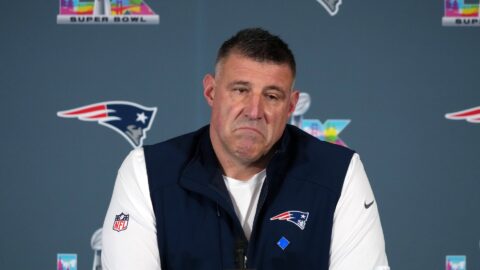Editor's note: NESN.com is running a five-part series on Shawn Thornton this week. This is Part II. Part I focused on his early days.
Shawn Thornton was certain there had been a mistake.
He had gone to the 1995 Ontario Hockey League draft planning only to sign a tryout agreement with the London Knights once the draft had been completed. He never actually expected to get picked. And even after his name was called, the future two-time Stanley Cup champion had his doubts.
"I went to the OHL draft to sign a walk-on with the London Knights," Thornton said. "I walked out of the bathroom and my name was on the board. I literally had to go grab my friend's book to see if there was another Shawn Thornton in there because I didn't think it was me."
But Thornton had caught the eye of one scout, with Peterborough general manager Jeff Twohey happening to see Thornton in a midget tournament in Hull, Quebec. Twohey was waiting to watch the final game in the tournament, but Thornton's showing in a fight in the earlier game grabbed his attention. Twohey planned to take a chance on the young tough guy, but first he had to make sure Thornton was even eligible.
"Shawn was eligible for two years and was passed over," Twohey said. "He'd been cut from every Junior B team in the area where he lived in Oshawa, so to make him eligible for the draft a third time I had to add his name to the draft list."
Each OHL team was allowed to add up to five names not listed in the league's scouting rankings to the draft pool. Twohey used one of his spots on Thornton, but still surprised his scouts, not to mention Thornton himself, when he actually called his name. Then it was Twohey's turn to be surprised.
"We were in the eighth or ninth round and I just told my scouts, 'We're going to take this kid. There's just something about him.' I told them he won't be here, he probably doesn't even know he's eligible," Twohey said. "So I stood up, announced his name and sat down, not thinking he was even at the draft, and within it seemed like 30 seconds he was at our table."
It took a little longer for Twohey to realize how fortunate he was to have stumbled upon Thornton at that tournament, but he recognized right away that Thornton had the drive to be something special.
"When you have that determination and all you want is that opportunity and you have that passion to be a player, then you've got a chance," Twohey said. "He should be a role model to a lot of young players.
"I'm so proud of him," Twohey added. "I wish I could say I was smart enough that I picked him out as a player. I just happened to be there and gave him the opportunity. He did the rest."
And did anyone from that late game Twohey was waiting around to watch ever make it to the NHL?
"No, but that's scouting," Twohey said. "Sometimes you get lucky, and Shawn was probably the guy I got luckiest with."
Leaving home
Thornton also got lucky with how things turned out off the ice as well. Peterborough wasn't far from his hometown of Oshawa, allowing Thornton to return home frequently to see his family.
"I was fortunate," Thornton said. "Peterborough is 35 minutes from my house, so I got to see my folks twice a week. Our assistant coach was from Oshawa, so we'd play on Saturdays and he'd go home and I'd jump a ride with him."
The time between visits home did require some adjustments, though, as Thornton moved in with a billet family.
"Living with new people, the first year was really tough," Thornton said. "There were two of us out in the middle of nowhere 20 minutes outside of Peterborough. They were great people, but the living conditions weren't what I was used to."
Things got better in his second season in Peterborough, when Thornton moved in with Janice Boudreau and her family. Boudreau had worked with Thornton's mother, Christine, and the Boudreau house quickly became a second home to Thornton.
"I went to one of the games and I saw Janice and she said, 'Oh you must be here to see your Generals,' and I said, 'No, I'm here to see the Petes,'" Christine Thornton said. "She didn't connect the name at first, because when I used to work with her Shawn was just little. But they invited him out to dinner a couple of times and they ended up billeting him the next year, and spoiling him rotten. Rotten. The stuff she did for him was unbelievable. She really went out of her way for him."
Adapting to a new role
While Thornton adjusted to new living conditions away from the rink, he also had to adapt to a new role on the ice. He may have initially caught Twohey's eye with a fight in a midget tournament, but fighting was not a regular part of Thornton's game.
"I got cut from Junior B," Thornton said. "They said I wasn't tough enough actually, which is kind of funny."
He knew that would have to change if he wanted to make the Peterborough roster, and he got some help from local coach Lionel Engelton, whose arduous workouts and boxing lessons prepared the youngster for the on-ice wars of the OHL.
"He was a big part of me making that junior team," Thornton said. "I trained with him 2-3 times a week on top of my other workouts. He was very good at getting inside your head and making you competitive and get through that wall. Growing up I fought, but I wasn't a fighter. I didn't have that mentality, but he helped me got into a place where I could put my head in a spot where I could do it.
"He taught me a lot," Thornton added. "Going into camp I knew I was going to have to fight my way onto the team and he helped me get there doing that."
The first challenge in camp came from the Petes' incumbent tough guy. John "Boom Boom" Shamoon was Peterborough's resident heavyweight, and he wasn't going to give up his spot on the roster without a fight — literally.
"The first day of camp I squared off with the tough guy they had from the year before," Thornton said. "It was a good fight. I guess they deemed I was a little better hockey player than him and they kept me."
Dave Duerden was one of the Petes' leading scorers and a close friend of Thornton. Duerden remembers the bout against Shamoon, who was born in Iraq but grew up in Ontario and Duerden said was nicknamed the Baghdad Brawler, as being a turning point for Thornton.
"I knew he was tough, but you never really know until they get in that situation," Duerden said. "I remember in training camp there was a very looked forward to tussle with Shamoon, who was our enforcer at the time, and Shawn had no problem with him. And from there, he gained respect from that."
Thornton established himself in the league in his first season in 1995-96. He collected 192 penalty minutes in 63 games, earning respect from teammates and opponents alike.
"He was everything that you hope for as a teammate," Duerden said. "He was willing to pay the price for everybody. Everything he's gotten in his career he's earned and it's been uphill for him. He wasn't going to give up an inch for any one of his teammates, and that's the way it was right from the first day I met him.
"Every rink we went into, he knew what his job was and we knew what was going to happen," Duerden added. "I just remember the buildup to all those tilts. He had a big battle with a guy in Sudbury by the name of Brandon Sugden that was highly anticipated and went very well for Shawn, as most of his fights did, just about all of them."
Even when they didn't, Thornton wasn't discouraged. Instead he continued to learn and improve as he honed his abilities as an enforcer.
"He just got better and better," Twohey said. "He really had that determination. He won most of his fights, but I could tell even when he lost a fight, it didn't deter him. When he came to our camp, he wasn't in awe of anything. In his mind, he really belonged there, so I think he's always had that quiet determination and confidence. There's a lot of special attributes to him."
More than just a fighter
Thornton was making a name for himself as a fighter, but he wasn't willing to be pigeonholed as strictly a goon. He wanted to show he could contribute in other ways, and he eventually earned that chance.
"To Shawn's credit, he got his opportunity on toughness, but he never wanted to be a guy to just sit on the bench and go out and fight," Twohey said. "He played. He had the ability to play. There was some skill there and when you work that hard every night, points are going to come to you. I think after his first year, people in the league here respected him and gave him a little more room and that allowed some of his skills to develop."
Thornton finished with 4-10-14 totals in his first season, but really blossomed with increased ice time in his second year. Moving between forward and defense, Thornton put up 19-10-29 totals while still racking up 204 PIMs in 61 games.
"I had the opportunity to play on his line in our last year of junior together, and he was no slouch as far as hockey IQ goes," Duerden said. "He scored about 20 goals that season, and you don't score that many goals in an OHL season unless you know where to go and you can put the puck in the net."
Thornton credited his Peterborough coaches for helping his development. Dave MacQueen was the Petes' head coach in Thornton's first season, with assistant Brian Drumm taking over for Thornton's second and final year in 1996-97.
"He was a smart hockey coach," Thornton said of MacQueen. "He always did his best to put me in situations to succeed. I played a limited role that [first] year, fourth-line winger. We had an unbelievable team. We won the OHL and went to the Memorial Cup finals. He kind of kept me away from guys I shouldn't have been fighting my first year. He definitely didn't throw me to the wolves.
"He was very good at talking to me and really trying to teach me how to do it, even though he wasn't a guy who ever had to do that job," Thornton added. "He was a goal scorer. The assistant coach, Brian Drumm, actually had to do it a little bit, and he helped me out. For that point in my life, I probably couldn't have had two better coaches."
Thornton was 14th on the Petes in scoring in his first season, and just eighth in his second year. Duerden led the Petes with 84 points in 1996-97, while Bruins draft pick Cameron Mann topped the team with 102 points in 1995-96 and added 83 in just 51 games the following year.
But Mann went on to play just 93 games in the NHL and Duerden had just a two-game cup of coffee with Florida in 1999-2000. No one on that Peterborough club has lasted longer in the NHL than Thornton, who enters this season with 369 regular season and 62 playoff games on his resume.
"It surprises me every day," Thornton said of outlasting his "more skilled" junior teammates. "A lot of those guys may have made it, but they went to Europe at [age] 24 or 25. They got sick of the grind in the minors. They were skilled guys. They could go to Europe and make $100,000 or $150,000. I never had that option, so I kept slugging it out in the AHL and finally I got a chance."
Thornton's ex-teammates don't begrudge his success at all.
"We were really close, like brothers," Duerden said. "There are a few guys that you play with along the way that you have a close enough relationship with that you wish you could be there with them, as opposed to instead of them. We all have that competitive spirit, but a guy like Shawn I always wished I could have been there with him, but never instead of him.
"It's just so impressive to see where he's gotten," Duerden added. "He was handed nothing. His whole career has been an uphill battle. The guy has had to fight for everything he has. And you look at him now with two Cups in five years and it's amazing. But at the same time, he's earned everything."
The first championship
Long before Thornton earned those Stanley Cup rings in Anaheim and Boston, he claimed his first championship in Peterborough.
The Petes won the OHL title in 1996, earning a spot in the Memorial Cup. Thornton chipped in three goals in 24 playoff games that spring, but he found other ways to contribute as well.
"I can remember in his rookie year in the playoffs we were playing Kingston," Twohey said. "They weren't a bad team, but they were maybe a little arrogant. And I remember Shawn, in Kingston, going right to their bench and I don't know what he said, but you could see everything kind of quiet down. He read that team well and he knew nobody was going to challenge him, and he went and maybe in some ways embarrassed them. But they saw that look he has, and he has that look that can intimidate you."
Thornton did more than just intimidate, though. He also played a key role on the team right from the very beginning.
"The determination he had, and the grit and the toughness," Twohey said of what he remembered most from Thornton's junior career. "Everybody knew he could fight. He established in junior that he was a good fighter, that he was legitimately tough. But he was a big part of our team that year as a rookie. He was a hard, grinding winger and he gave our skilled players a lot of confidence and fit right in."
Twohey also took special satisfaction in having discovered Thornton and stolen him away from Peterborough's most bitter rival in Oshawa.
"Geographically, our biggest rival in Peterborough is the Oshawa Generals," Twohey said. "Shawn was from Oshawa, but never got a chance from them. It's ironic that he ended up playing in Peterborough. That was pretty rewarding when I got a guy right out of their backyard."
Oshawa had the last laugh, however. In Thornton's second season, the Generals, led by a nifty playmaking center named Marc Savard, ousted the defending OHL champs in the second round of the playoffs.
"In the playoffs I played defense," Thornton said. "That's the reason Savvy's team beat us in the second round. If I'm our fourth defenseman, we're in trouble. We had a bunch of injuries."
Thornton's junior career may have ended a bit earlier than he had hoped, but he had no regrets about his time in Peterborough. And the Petes certainly didn't regret giving the unknown kid from Oshawa a chance.
"We've had a lot of great players come through here," Twohey said. "Eric Staal when we drafted him was 5-foot-11, 145 pounds, a scrawny little kid, and to see what he grew up to be was pretty rewarding because a lot of people questioned us when we took him. But right with him is Shawn Thornton, because he was really under the radar.
"That's what you live for in junior hockey," Twohey continued. "You try to create opportunities for kids like Shawn. That's why I did what I did for so long. You don't make a lot of money, all you get is a real feeling of satisfaction that in a small way you helped a kid get a great opportunity and he did the rest."
For Part III, click here.



